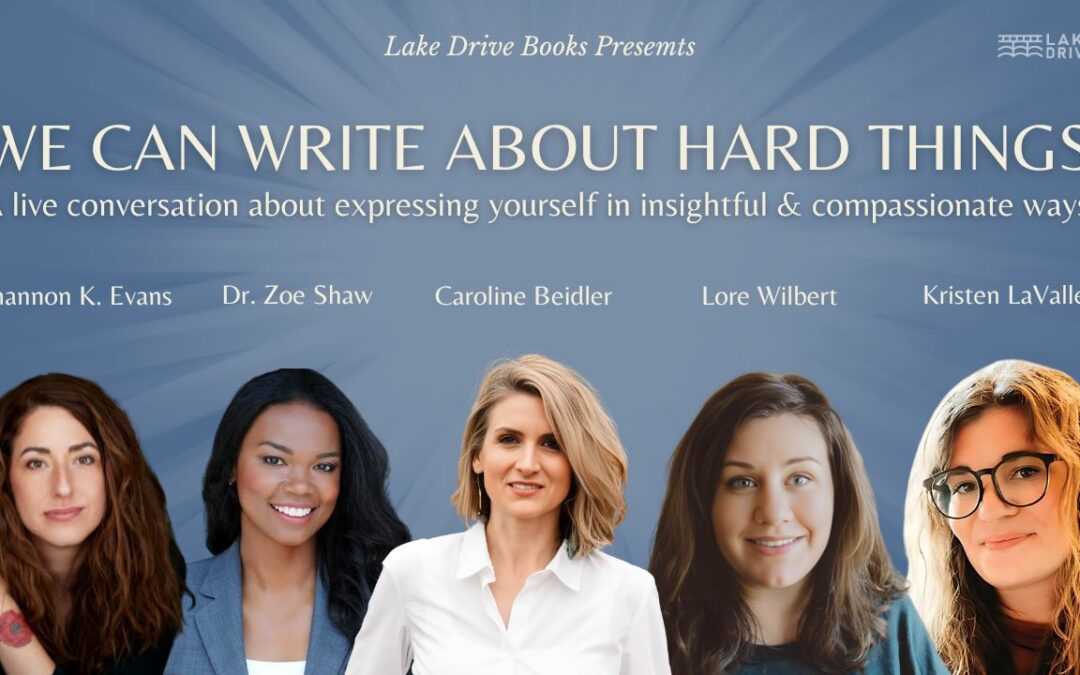Lake Drive Books is no stranger to helping authors write about difficult topics. We were honored to be able to present the below live video conversation (including Lake Drive author Caroline Beidler).
“We Can Write About Hard Things” brought together five authors to explore the art of writing about difficult topics, offering insights into how they navigate their own vulnerable stories while connecting with readers. Hosted by David Morris of Lake Drive Books, the panel featured Caroline Beidler, Dr. Zoe Shaw, Kristen Lavalley, Shannon Evans, and Lori Ferguson Wilbert, each of whom shared personal experiences that shaped their writing.
The discussion began by emphasizing the significance of vulnerability in storytelling. Each author, though from different backgrounds and perspectives, agreed that telling hard truths can foster deep human connections.
Caroline Beidler, an addiction recovery advocate and author of You Are Not Your Trauma: Uproot Unhealthy Patterns, Heal the Family Tree, spoke about the intimacy of writing her new book with her mother, where they explored intergenerational trauma and healing. The depth of their shared experience created a profound sense of catharsis not only for them but for readers as well. Beidler highlighted how honesty in writing can offer readers a similar release, helping them confront and heal from their own struggles.
Shannon K. Evans, reflecting on her newly published book, The Mystics Would Like a Word: Six Women Who Met God and Found a Spirituality for Today, touched on the importance of embracing vulnerability while keeping certain personal stories private. She shared her struggles with mental health, and how, over time, she learned that healing in storytelling often involves finding the right balance between sharing openly and maintaining personal boundaries. Her experience resonated with many aspiring writers in the audience, who grapple with how much to reveal about their personal lives without crossing into overexposure.
Kristen LaValley, author of Even If He Doesn’t: What We Believe about God When Life Doesn’t Make Sense, offered a particularly insightful piece of advice for writers: “Write once for catharsis and once for craft.” This approach allows writers to process their emotions privately before editing their work for public consumption. She emphasized the importance of pacing and rhythm in writing hard truths, recommending that writers introduce difficult content in layers to avoid overwhelming readers. Lavalley’s own writing journey, centered on faith and suffering, has involved navigating pushback from her religious community. Her advice on building trust with readers through a gentle, nuanced approach to difficult topics was a highlight of the discussion.
Dr. Zoe Shaw, a clinical psychologist and author of A Year of Self-Care: Daily Practices and Inspiration for Caring for Yourself, shared her perspective on writing about complex shame, drawing from her own experiences as well as her clinical work. Her approach to storytelling involved weaving in her own journey with shame while offering readers practical tools for healing. She discussed the delicate balance between personal vulnerability and professional boundaries, especially as a therapist, ensuring that her writing helps rather than hinders her clients.
Lore Ferguson Wilbert added depth to the conversation by discussing the importance of integrating both the emotional and logical aspects of storytelling. Drawing from her book The Understory: An Invitation to Rootedness and Resilience from the Forest Floor, she shared how she navigates themes of alienation and resilience by alternating between personal narrative and insights about our natural world. This back-and-forth, she argued, helps readers process difficult emotions without becoming overwhelmed.
As the event concluded, the authors provided advice for aspiring writers. Central to their message was the idea of perseverance—continuing to write, even when the process is challenging—and the importance of community. Writing about hard things can be isolating, but finding a supportive community of like-minded individuals can make the journey more bearable and enriching.


